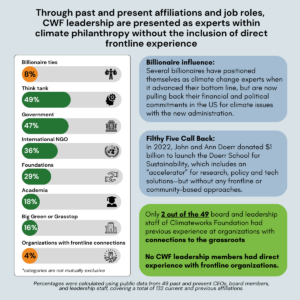More than a dozen organizations filed a complaint with the IRS this month alleging that the Walmart Foundation, the nation’s second-largest corporate grantmaker, had violated the terms of their status as a 501(c)(3) nonprofit by using grant dollars to benefit the company’s bottom line. The foundation, the community groups claim, made grants in urban markets where the company hoped to expand but had encountered opposition – grants designed to quiet discontent and curry favor with local lawmakers who might have stood in the way of Walmart’s corporate agenda.
If proven true, these allegations would no doubt tarnish the good work accomplished by a majority of the foundation’s grantmaking, and by corporate grantmakers across the country. Of course, it is yet unclear whether they are true, and NCRP has not evaluated the evidence presented by the nonprofit coalition. However, in the course of its research, NCRP has encountered similarly distressing patterns of grantmaking behavior by the Walmart Foundation.
In a recent essay, Executive Director Aaron Dorfman highlighted corporate grantmakers’ robust increase of funding benefiting marginalized communities. He praised these funders for their commitment to those most in need, and urged non-corporate funders to follow their lead. Even still, he tempered his praise, saying, “Philanthropy is a vehicle for corporate interests. Corporations are designed for profit maximization and market expansion, and corporate philanthropy generally is in service to those objectives.” In fact, surveyed corporate philanthropists cite business expansion into new markets and company reputation as two important objectives for their philanthropy.
This essay is a useful lens for evaluating corporate philanthropy in general, and the allegations against the Walmart Foundation specifically. Additionally, the research for this piece turned up information on the Walmart Foundation’s grantmaking that dovetails, unfortunately, with the allegations made this month.
In 2012, Walmart’s philanthropic giving, channeled through the Walmart Foundation, amounted to $182 million for afterschool programs, community development initiatives and other worthy causes. The Walmart Foundation signals publicly that Walmart considers itself part of a broader social ecosystem – that the company is serious about having a positive impact.
But a closer look at the Walmart Foundation tells a more complicated story. About a third of the Foundation’s giving has been to support direct service organizations, food banks and United Ways. While the immediate necessity of simple charity for the needy is indisputable, it does little to address the systems that perpetuate poverty and discrimination. The Foundation has given millions to Goodwill Industries and other low-income job training and placement organizations under its “Career Opportunity” programmatic umbrella. This work is necessary, but insufficient. We should ask ourselves what or who creates the need for direct service charity in the first place; who stands to benefit from more low-wage labor; and what long-term change this philanthropic approach effects.
In the same survey of corporate grantmakers cited above, respondents indicated they prioritize the personal interests of their company’s CEO or board members when devising their philanthropic priorities before community needs. This open disclosure of favoring an insular, top-down approach that puts profits first provides an honest picture of corporate philanthropy. Much of the Walmart Foundation’s support for Goodwill Industries, for example, funds job training for low-wage work and also job fairs at which Walmart is a featured recruiter. This happens even though the Foundation’s funding guidelines prohibit grants that might “supply candidates for Walmart employment.”
What’s more, Walmart’s lobbying disclosures mention the National Labor Relations Board more times than any other corporation. These documents almost all cite “concerns” with NLRB decisions. Walmart’s lobbyists harangued legislators with “concerns with efforts to implement provisions of…the Employee Free Choice Act,” a law that streamlines labor union formation, and “concerns with NLRB decisions potentially impacting bargaining unit determination.” It is clear from the tone and content of the disclosures that Walmart’s goal is to weaken the Board’s rulings on fair organized labor practices, illustrating just how slippery the Foundation’s grantmaking behavior with respect to labor really is.
To be clear, none of this behavior is unlawful. But is it philanthropy worthy of the public trust, tax benefits and glowing publicity afforded the Walmart Foundation? Might it be indicative of a philanthropic institution whose balance of interests has teetered too far toward profit and away from social change?
Tricia Moriarty, director of global responsibility communications for Walmart, responded to the allegations in part by lamenting the very idea of a critique of the Foundation’s practices. “It’s unfortunate,” she said, “to see criticism of the Foundation’s charitable giving.” On the contrary, constructive criticism is essential for any foundation to improve its grantmaking. We look forward to more details on the Walmart Foundation’s grantmaking, and we hope the public continues to question philanthropic practices that aren’t in its best interest.
Ryan Schlegel is research and policy associate at the National Committee for Responsive Philanthropy (NCRP). Follow @NCRP on Twitter.
































































































































































































































































































































































































































